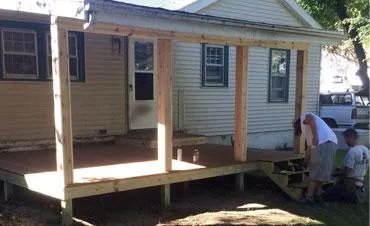
Home . Home Additons
cUSTOM CONTRACTS
Contracting Services
1. Initial Consultation
Understanding Client Needs: Begin with a thorough consultation to understand the client's specific needs, concerns, and preferences. This includes discussing the scope of work, budget constraints, desired materials, and any special requirements (e.g., energy efficiency, aesthetics).Site Inspection: Conduct a detailed inspection of the property to assess the condition of the roof, siding, windows, or other relevant areas. This helps in identifying the necessary work and any potential challenges.
2. Detailed Scope of Work
Customized Services: Based on the consultation and inspection, outline a detailed scope of work that addresses the client's specific needs. This might include different types of roofing materials, repair strategies, or additional services like gutter installation or window repair.Clear Specifications: Include precise specifications for materials, brands, and installation techniques that will be used. If the client has preferences for certain products or brands, ensure these are clearly mentioned.
3. Flexible Pricing Structure
Itemized Costs: Provide an itemized breakdown of costs, including labor, materials, permits, and any additional services. This transparency allows the client to see where their money is going and makes it easier to adjust the contract if needed.Options for Upgrades: Offer different pricing tiers or optional upgrades. For example, you could provide a basic package and then offer premium materials or extended warranties as optional additions.
4. Timeline and Milestones
Custom Timeline: Develop a project timeline that fits the client's schedule. Include key milestones, such as the start date, completion of major tasks, and final inspection.Contingency Plans: Address potential delays (e.g., weather conditions) and how they will be managed. Include provisions for any necessary adjustments to the timeline.
5. Warranty and Maintenance
Tailored Warranty: Offer a warranty that is tailored to the specific project. This might include extended coverage for certain materials or additional post-installation inspections.Maintenance Agreement: Propose a maintenance agreement that includes regular inspections, minor repairs, and cleaning services. This can be customized based on the client's long-term needs and budget.
6. Payment Terms
Customized Payment Plan: Provide flexible payment options, such as installment plans, to accommodate the client’s financial situation. Outline the payment schedule clearly, with due dates tied to project milestones.Incentives for Early Payment: Consider offering discounts for early payment or for paying in full upfront, as a way to incentivize timely payments.
7. Legal and Compliance Clauses
Permits and Regulations: Ensure the contract includes clauses that address compliance with local building codes and regulations. Clearly state who is responsible for obtaining the necessary permits.Liability and Insurance: Include provisions that outline the company’s liability in case of accidents or damages. Make sure the client is aware of the insurance coverage provided by the company.
8. Customization Clauses
Change Orders: Provide a clear process for handling change orders. This allows the client to make changes to the project scope after the contract is signed, with agreed-upon adjustments to cost and timeline.Client-Specific Requests: Include clauses that address any specific requests from the client, such as the use of environmentally friendly materials, specific working hours, or special accommodations.
9. Communication Plan
Regular Updates: Outline how and when the company will communicate with the client throughout the project. This might include regular updates via email, phone, or in-person meetings.Point of Contact: Designate a specific point of contact within the company who will manage the project and address the client's questions or concerns.
10. Review and Approval Process
Client Review: Before finalizing the contract, review all terms with the client to ensure everything aligns with their expectations. This is an opportunity to make any final adjustments.Signatures and Documentation: Once the client is satisfied, both parties sign the contract. Provide copies to the client and ensure all documentation is securely stored for future reference.




